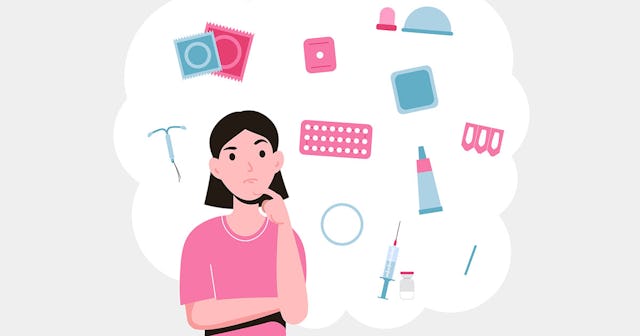Teenagers Shouldn’t Need Their Parents' Permission For Contraception, Even IUDs

Teenagers are having sex whether parents want them to or not. It’s just a fact of life. And if teens are having sex, they need direct access to contraception, and they shouldn’t have to get permission from their parents. And not just for your typical forms of birth control, but all methods, including more “invasive” ones like IUDs.
That may be shocking to hear. It’s a scary thought because, as parents, we know that our teenagers don’t always make the smartest decisions. And most parents see it as their job to guide their kids on important matters like sex. But requiring parental consent is actually a significant hindrance to teens acquiring sensitive health services like contraception and, in turn, is a risk to their health and safety.
RELATED: What Is Sex With An IUD Like? Is Rough Sex OK? All Your Pressing Questions, Answered
Ideally, teens and their parents should be able to have an open and honest conversation about sex, but that is not always the case. Some teenagers are simply too embarrassed to have conversations about sex with their parents. Others don’t have a responsible parent to turn to that is willing to talk about sex. And some teens justifiably fear that telling their parents about their sex life may lead to abandonment or abuse.
Teenagers are already a high-risk population. According to the ACLU, four out of 10 females get pregnant at least once before turning 20, and three million U.S. teenagers a year contract a sexually transmitted disease. Furthermore, a study published in the Journal of the American Medical Association found that more than half of sexually active girls involved in the study said they would stop accessing all reproductive healthcare services if they had to get parental consent. Yet, 99% of these teens said they would continue having sex. As a parent, that’s scary!
The last thing we need to do is put barriers in place to prevent our kids from seeking sexual and reproductive health care. Leading medical organizations also oppose laws that require teens to acquire parental consent for access to such services. These organizations include the American Medical Association, the American Academy of Pediatrics, and the American College of Obstetricians and Gynecologists.
And over the past 30 years, this stance has been reflected in changes in both federal and state laws. The Affordable Care Act, or Obamacare, mandates that insurance companies cover contraception services, even for teens. Federally funded Title X clinics, such as Planned Parenthood, mandate confidentiality for teenagers seeking contraceptive services in those programs. The District of Columbia and 27 states explicitly allow all minors to consent to contraceptive services, and 19 states allow some minors to consent, such as those that are married, face a health risk, or are parents.
However, not all states give equal access to all services. Some states want to subject more “invasive” forms of birth control, such as IUDs, to parental approval. A group of lawmakers in the Maryland House of Delegates proposed a bill that would require minors to obtain parental permission before getting certain contraceptive services, including IUDs and implantable rods. But bills like this could jeopardize access to the appropriate reproductive medical care for some teens.
And these kinds of decisions seem to be based on a lack of knowledge. Providers operated under the misperception that IUDs are not safe to use in teenagers. This dates back to the 1970s when an IUD brand was linked to pelvic inflammatory disease (PID) and infertility to the 1970s. So until recently, doctors usually recommended this form of contraception to women who had already given birth.
Since, the American College of Obstetricians and Gynecologists and the American Academy of Pediatrics have endorsed the usage of IUDs for healthy women, including teenagers. And moreover, the American College of Obstetricians and Gynecologists now says that birth control placed in the body by a doctor, such as an IUD, is the best form of birth control for teens.
So why are IUDs considered a good form of birth control for teenagers? IUDs are small, T-shaped intrauterine devices made of copper or plastic. They are reversible contraceptive methods that require a prescription and must be inserted into the uterus by a healthcare provider.
Copper IUDs are toxic to sperm and cause sperms’ movement to change in ways that prevent them from fertilizing an egg. Hormonal IUDs release progestin, a synthetic hormone that causes cervical mucus to thicken, preventing the sperm from reaching the egg. They can also prevent ovulation, meaning no egg is produced for fertilization.
Frankly, IUDs are a good option for teens for many reasons. Both types of IUDs are over 99% effective at preventing pregnancy, while hormone pills are 91 percent effective and condoms are 82 percent. They have a one-time cost ranging from approximately $50 to $950 and can last from 3 to 12 years, depending on the IUD type and brand. Most importantly, they do not require remembering a daily dosage and are also quite discreet.
A Colorado program offering access to free or low-cost IUDs over eight years made the benefits of IUD usage in teenagers apparent. The program provided over 40,000 contraceptive implants to women in Colorado. During that time, the program reduced births by 20 percent for 15- to 17-year olds and 18- to 19-year-olds in zip codes near participating clinics.
The bottom line is giving teenagers consent and autonomy over their bodies supports teens in making better choices regarding their sexual and reproductive health. Requiring parental consent for contraception can create a dangerous barrier for adolescents to vital health care services. And besides, would you rather find out that your teenager had an IUD implanted or that you are going to be a grandparent?
This article was originally published on